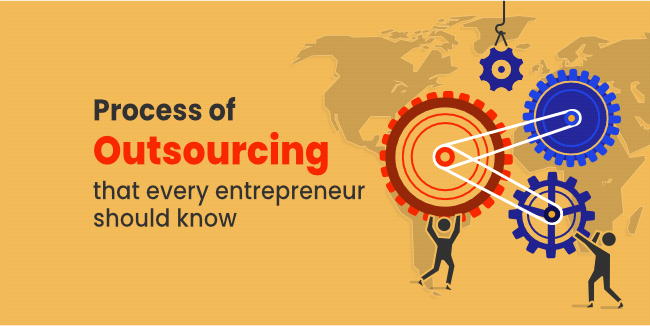outsourcing
Process
management
Process of Outsourcing - that every entrepreneur should know

Many entrepreneurs believe IT outsourcing is one of the best ways to gain market advantage. It is a highly flexible solution for startups, small businesses, and large corporations.
However, despite the great advantages of outsourcing, sometimes things go wrong. There can be many reasons for this situation, but our experience as a software development company shows that the failure of outsourcing projects is often associated with an improperly conducted outsourcing process. Each stage of this process is essential, and each affects the implementation of the project. That is why it is so crucial to understanding what exactly the outsourcing process is all about.
Outsourcing as a Business Process
Business processes require adequate approach and management, regardless of business operations and the industry. However, many people forget that outsourcing is also a business process. The way it is used has a fundamental impact on whether it will bring the intended results or not.
The attractiveness of outsourcing consists not only of access to high-class specialists and the ability to implement projects at a specific time but also of inseparable cost savings and efficiency. Properly used outsourcing increases the competitive advantage and affects the company's financial success. But poorly managed outsourcing services can have catastrophic effects, not only for the commissioning company but also for an outsourcing company.
To fully use the tool, which is outsourcing, you need to fully get to know its benefits, disadvantages, as well as outsourcing models. Understanding the outsourcing process, which affects each stage of project implementation, is also crucial.
Process of Outsourcing
Each outsourcing process has 7 universal stages, regardless of the size of the enterprise and the industry it concerns. Let's take a closer look at them.
Step 1: Assessment of Business Needs and Outsourcing Strategy
Each stage of the outsourcing process is essential, but approaching stage 1 too superficially is a sure guarantee of failure. An objective and honest assessment of the company's business needs is critical to choose solutions that meet the company's needs. An inaccurate assessment of the company's situation will lead to inaccurate solutions, and this can have disastrous consequences in terms of choosing the right outsourcing providers or choosing an unfavorable outsourcing contract.
An objective analysis of the company's situation and business needs will allow you to choose the right outsourcing strategy that meets the company's needs. At this stage, carrying out a risk-benefit analysis of outsourcing deals is crucial. It simply means preparing a statement of benefits and comparing them with a statement of risks. Of course, the best solution is when the benefits far outweigh the risks.
Step 2: Scope of Work with Outsourcing Company
The next step is to define the scope of cooperation with the outsourcing company. It is a highly individual matter, and our observations show that very often, the scope of cooperation depends not only on the company's business needs but also on previous experience with outsourcing. Some companies prefer comprehensive business process outsourcing services, and some prefer to focus on individual tasks. Due to the many types of outsourcing, each company can find a solution that best suits its needs and preferred style of cooperation with an external supplier.
Step 3: Choosing the Right Software Partner
The next step in the process is to choose the right software partner with the right resources, tech stack, services, and experience in running the desired projects. The opinions and recommendations of other customers are also important.
If you make the right choice, we are sure the outsourcing relationships established during the first contract will be strong enough that you will not want to change the external supplier. But if the choice of supplier turns out to be wrong, then unfortunately, you will have to go through this path again.
The experience of many clients shows that finding the right external supplier and developing a positive outsourcing relationship with them is pretty common. Choosing the right supplier is undoubtedly challenging and often comes at a high emotional cost. In our article "Choosing the right software partner - guide," we discussed in detail what aspects should be considered when looking for the best outsourcing partner.
Step 4: Contract

It happens that companies in the rush of work do not sign a contract with an external supplier. It is a huge mistake because the contract is a security for both parties. A well-constructed contractual agreement defines the scope of responsibility in the event of a dispute and prevents unpleasant surprises. In addition, it regulates many vital issues, such as property rights or the level of commitment in the event of subsequent project implementation.
The article "Contract for software development - all you need to know" discussed a good contract's key elements.
Step 5: Start the Project
Once the contract is signed, both companies will work together to transfer resources and responsibilities from your company to the service provider. It means the formal start of a project where authority is delegated, knowledge is shared, and work is redistributed to be done quickly and seamlessly.
This stage is crucial for the success of the process because it will determine how good the further cooperation will look.
At this stage of the outsourcing process, the most important activities include the ongoing assessment of the relationship, solving problems and misunderstandings, developing a communication strategy, organizing knowledge, and managing processes.
Step 6: Management

It is the longest stage of the entire process, as it begins at the start of the project and ends with it. The management scope can vary and may concern the whole project or its various aspects, e.g., relationship management. Generally, management is about monitoring and managing a project to ensure it is completed on time and within budget while meeting consumer expectations. Project management is a challenging task. It requires a lot of experience and excellent interpersonal skills.
Step 7: Completion of the Project
Although the completion of the project is the last step of the outsourcing process, it is necessary to prepare for it already at the stage of creating the contract. Previously prepared procedures will make both parties feel comfortable and will know what they can expect from each other at this stage. As a rule, once-built trust and outsourcing relationships last for years; however, ensuring the project's completion is a predictable process for all participants is worth ensuring that the project's completion is a predictable process.
Summary
There is no need to convince anyone about the benefits of outsourcing, as the popularity of this solution speaks for itself. However, remembering that you must be properly prepared for this process is worth remembering. Knowing about outsourcing will help you avoid pitfalls and focus on the critical stages of the process that will translate into project success. Of course, a trusted offshore company will guide you through the process. Still, you will feel more confident if you have a certain level of knowledge yourself. For this reason, we have prepared a series of articles about outsourcing that will help you understand the topic in depth.
As an offshore outsourcing company, we have been creating successful projects for many years, and we help our clients gain a market advantage. We believe that each client is different and requires an individual approach that will meet their business expectations. If you want to find the best solution for your company, arrange a free consultation with our specialists.